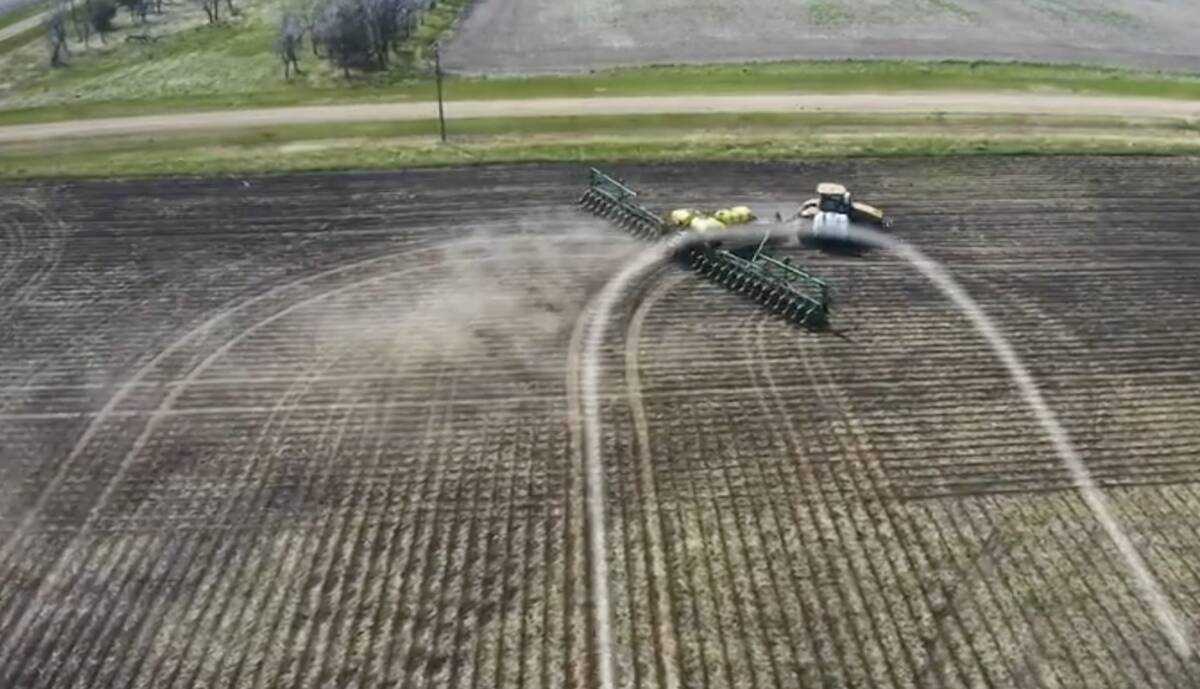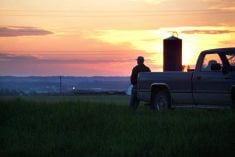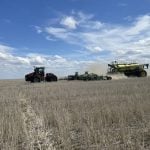Note: On October 2, 2023, Canterra Seeds appointed Brent Derkatch as its new president and CEO. Derkatch has been working with Canterra since 2001, most recently as the director of the pedigreed seed business unit.
When a key employee leaves your farm operation, how much notice is best? If they leave too abruptly, you might end up short-handed. But if an employee announces their exit months in advance, will they have their head in the game while they’re still on your payroll?
Read Also

Are farmers ready for the digital ag revolution?
How farmers are using technology to remain competitive, find opportunities and meet challenges.
And what if it’s you — i.e. the boss — who’s leaving? How can a retiring leader ease the transition to the next-in-charge without risking the company’s success?
Like you, David Hansen, president and CEO of Canterra Seeds, had to think it through. Retirement was beckoning, so how far in advance should he make the big announcement?
For Hansen, as he explains below, the right answer seemed to be two years. That’s the notice he gave his board of directors, and so far, it seems to be working well.
Moving on
For 14 years, Hansen has guided Canterra Seeds, and now he’s helping plan the next step — his own retirement. “December 29th will be my 65th birthday,” Hansen says. “That’ll be the end of my work time, as I know it today.”
Hansen broke the news to Canterra’s board of directors those two years ahead of his target date, and well before his upcoming retirement became public knowledge. “We knew we better start thinking,” recalls Lloyd Affleck, Canterra’s board chair.
When a key member of a business team leaves suddenly or on a tight time frame, the business may struggle to find and train a replacement. There are other risks too, including on the farm. If the leaving employee dealt with buyers, suppliers and other outside partners, these relationships could suffer after the changeover.
Having extra time to plan for change typically makes things easier, especially when the person who is leaving exits on good terms and takes time to help with the transition.
Hansen’s lengthy horizon gave Canterra’s board of directors several months to make decisions about their next steps.
But how long should a departing employee stay on the job? Is it possible to give too much notice? A team member with one eye on the exit door may come to work with a short-term outlook and not have their whole heart in their work. This could make other team members uneasy, wondering if they’ll have to take on the work their colleague has been doing. When it’s the boss leaving, employees might worry about who they’ll report to next, or whether they’ll be promoted.
Like Canterra Seeds, farms are long-term businesses. How much notice do you expect from a key employee who finds another opportunity? If you’re planning your own transition away from the farm, how much notice will you give your farm team?
Meet Dave Hansen
After 47 years in ag biz, says Hansen, “I think it’s the right time for myself and my family.” Not that he’s getting ready to put on fuzzy slippers and lounge in front of a fireplace. He’s been appointed chair of 4-H Canada’s board of directors and seems likely to take on other part-time or volunteer activities, inside or outside of the agriculture industry.
But Hansen has made it very clear that he will be stepping down from his full-time role. “We all know individuals who see no end date, and that creates some anxieties for others that are following in their footsteps,” Hansen says. He’s certainly not there yet, but, he says, “I’m going to get to a stage in my life where I’m going to run out of energy.” Hansen compares retiring from the business world to athletes giving up their sports: he admires players who leave at the peak of their game.
Farmers rarely say, “I’m 65, it’s time to hang up the tractor keys.” Still, some farmers retire from management decisions — still providing advice and labour on the farm — in contrast to others who are determined to keep all their decision-making power.
When this happens, Hansen says, sometimes the next generation isn’t given the reins early enough, or soon enough, “where they could really do something.”
Like farms, the seed business has a 12-month business cycle. Having two years advance notice from Hansen gave Canterra’s board of directors two business cycles to plan for their future. “I wanted to give the board sufficient time to think, ‘Okay, here’s where we are today. This is where we think we’ll be when he’s ready to leave.’”
Retiring farmers can usually control who will take their place. Not Hansen, though. Canterra’s board of directors will choose his replacement. Even so, whether it’s on the farm or in the executive suite, the next manager has to have an opportunity to implement their own new policies.
“The next person is going to be different than who I am,” Hansen says, and he’s convinced this is a good thing. “It wouldn’t make any sense to hire another me.”
When Hansen jokes, “Surely they’re smarter than that!” he’s hinting at a serious point. He has grown Canterra Seeds exponentially during his time as CEO. Now, new strategies will be required to continue driving that growth
“They want to hire somebody that’s going to take that business to the next level,” he says.
Growing a business, whether it’s a farm or a seed company, is about continuously implementing strategy. “Me leaving is just as strategic as some of the other things that we’re doing,” Hansen says.
As CEO, Hansen has developed and implemented strategies in multiple areas of the seed business. Canterra Seeds began in 1996, started by nine seed growers. Since then, the company has grown to include 182 seed grower shareholders, and also partnered with ag retailers and others. The company has always looked to bring the newest and best genetics to the Canadian seed market, and by the end of its 2022 fiscal year, Canterra had 36 staff and sales over $47 million.
During Hansen’s time at the helm, he also developed a relationship with the French-based seed group Limagrain that led to its purchase of a minority stake in Canterra in 2015. Canterra and Limagrain then developed Limagrain Cereals Research Canada as a joint venture in Saskatoon to develop local seed varieties for Canadian farmers.
It’s important to Hansen that the momentum he’s built at Canterra carries on, but that doesn’t mean the business must do exactly the same things in exactly the same way. “The next leader,” he says, “has got to be somebody who’s got more skills, more experience. Probably younger.”
Hansen is proud of the strong corporate culture he’s worked to build at Canterra. But any business has to keep changing to stay successful, and inevitably the business culture will change with a new CEO. “The culture always starts at the top,” he says.” But he believes the next leader will build on the work he’s done.
Hansen has left his board of directors ample time to choose another CEO. But is it too much time? Hansen points out that retiring is different than leaving one job for another position. “Once your decision is made that you’re going to another job”, he says, “mentally, most people have already moved on.” That’s why many companies ask employees to leave right away, instead of having them stay on to work out two-weeks’ notice.
Replacing the CEO
People retire with a different mindset, Hansen says. “Most people want to make sure that they’re leaving the business in good hands.” Hansen would be disappointed if his retirement creates problems for Canterra’s business, or most importantly, for Canterra’s staff. He wants the people he’s worked with to be working with his successor. “You want not to be disruptive when you leave the business.”
As chair of Canterra Seeds’ board of directors since 2010, it was Lloyd Affleck who hired Hansen for the CEO position. “He came to us at a time when the company needed a next step,” Affleck says.
Affleck has been a Canterra Seeds shareholder since 1998 and served as a board member since 2005. He’s recently retired from farming and living in Saskatoon, but was formerly a pedigreed seed farmer at Beechy, a couple of hours south of the city.
As board chairman, Affleck has worked closely with Hansen over the years.
From Affleck’s perspective, the key to their successful working relationship has been open communication. Affleck says the two-year time frame they’ve been given has allowed the board ample time to work with an HR firm to make a thorough search for a new president and CEO. As of late summer 2023, no announcements have been made, but Affleck says there has been a lot of interest in the position.
While Canterra’s directors kept this information to themselves for the first six months, Hansen did announce his planned departure to the staff before the board began its search for a replacement. “There were tears when he told the staff,” Affleck says.
Next steps
It’s clear when talking to Hansen that he aims to show his respect for his replacement.
“It’s not about ‘here’s the business plan, or the strategy.’ It’s more about, ‘let me introduce you to our partners’,” Hansen says. “Our organization is completely dependent on partnerships.”
It’s a word he uses carefully, embracing legal counsel, accountants, distribution partners, shareholders, trucking companies, bankers. “All these things are relationships, and they are partners.”
Hansen plans to make sure his replacement has the support of staff and Canterra’s business partners, and he’ll also give the next CEO his full endorsement. “I’d just like to be a helping hand for that individual that comes on.”
The definition of “help” will change from day to day. One day it might be, he says, “Let’s get on a plane and let’s go visit some of our seed retailers or our shareholders or our partners.” But there will also be times when the best way to help his replacement will be to stay home and keep out of the way.
Says Hansen, “It’s the same in a farm setting when the father takes the daughter or the son in with the banker or the accountant and introduces them and says, ‘This is what we’re doing, and here’s where we’re going.’”
Such a show of endorsement and trust can help the business maintain relationships through transition. And just as Hansen has accepted that his replacement is bound to do things differently, a retiring farmer must understand that their next generation is going to want to try new things too — even if, he says, “They’re going to make mistakes.”
When there’s a rumour that a farm may be coming under new management, business partners can be left wondering about the future of their relationships. Input suppliers could worry that the new head of the farm might find a new dealer. A trucker might suspect the new farmer might hire someone new or haul their own grain. Lenders and accountants might wonder if the farmer will shop around for new service providers.
Leadership change with no outside communication can upset long-term business partnerships.
Canterra’s board of directors knew their business partners would face uncertainty when they heard Hansen was leaving. “I did sense a bit that they were concerned,” says Lloyd Affleck.
Hansen and the board of directors have done a lot of work to reassure partners, and Hansen expects to do much more work once his replacement has been announced. “They probably feel fairly comfortable now,” Affleck says.
As to the concern that their industry partners might see the retiring Hansen as a “lame duck,” unable to deliver on future commitments, or that Hansen might not be fully focused on his job, Affleck is not worried. “I guess it could happen,” Affleck says, but he clearly doesn’t think so and he says Hansen is still doing great work to set Canterra up for future success. “He’s still setting goals, and he’ll achieve them.”
















